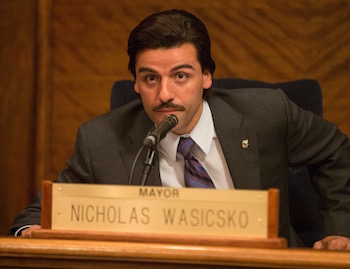TCA: David Simon Aghast That Actors Joined His Public Housing Mini 'Show Me A Hero'

The smarter way to stay on top of broadcasting and cable industry. Sign up below
You are now subscribed
Your newsletter sign-up was successful
Related: Complete Coverage of TCA Summer Press Tour
Beverly Hills, Calif. — David Simon said he has never had the caliber of the cast he has for Show Me A Hero, the six-part HBO miniseries he cowrote and executive produced. Premiering Aug. 16, Show Me A Hero is about public housing in Yonkers, N.Y. in the late 1980s and stars Oscar Isaac.
"Starting with Oscar, of all the things he could have done...” The Wire creator said Thursday during the show’s TCA summer press tour at the Beverly Hilton. “I’m coming with six hours on public housing in Yonkers, New York, and you’re not acting like I’m out of my mind. What were you people thinking?”
Isaac, a movie star with leading roles in upcoming films like Star Wars and X-Men, said he was drawn to the story and the format. “I thought, what an incredible story,” he said. “It happened not so long ago and not so far away.” Isaac added that he had never worked in a miniseries and TV series format, with more time to “build an arc for a character.”
His character, mayor Nick Wasicsko, grew into the leader he wanted to be, Isaac said. “Nobody could have expected what happened, not even him.”
Alfred Molina costars as Henry J. Spallone, an anti-housing Yonkers city council member. “I was just really attracted to playing a character who is racist but incredibly charismatic, a divisive political figure but at the same time with a huge following,” he said.
Despite his joke about the interest in a miniseries on public housing, Simon has had success on HBO with political and complex shows, not just The Wire but Treme as well. Based on the 1999 book by Lisa Belkin, the miniseries,cowritten by fellow Wire vet William F. Zorzi and directed by Crash’s Paul Haggis, is about the “struggle to govern when government was comprised of people who didn’t want to address the realities on the ground,” Simon said.
The smarter way to stay on top of broadcasting and cable industry. Sign up below
Public housing was “looked upon in great favor when it was for white people” after the Great Depression and later for returning veterans, Simon said — that is, until it was applied to the “last wave of immigration, African Americans and Latinos.
“They were supposed to live in a different America.”
Other highlights from the panel included:
— The producers said that the actors individually did their own research to try to look like and be like the real people they were playing — even if that meant unflattering facial hair. “I don’t think any of us could have forced Oscar to wear that mustache if Oscar didn’t want to,” Simon said.
